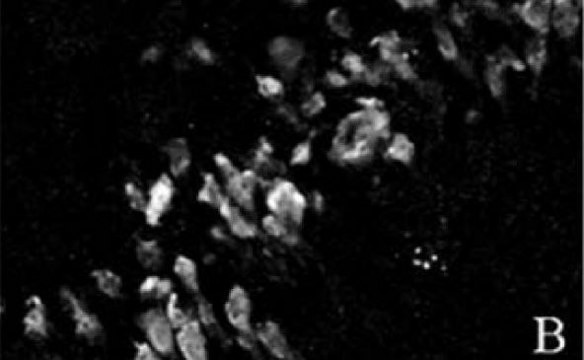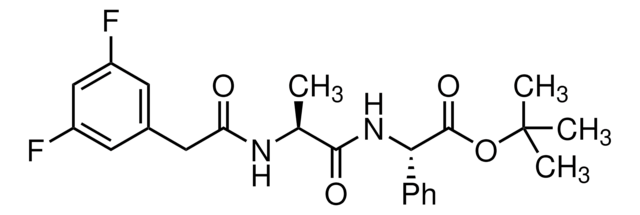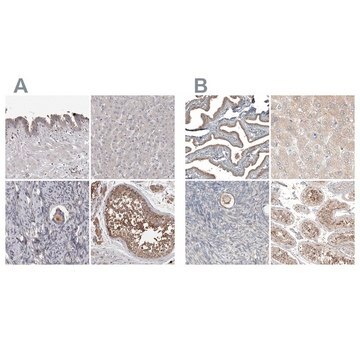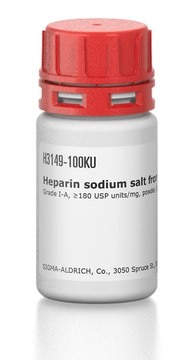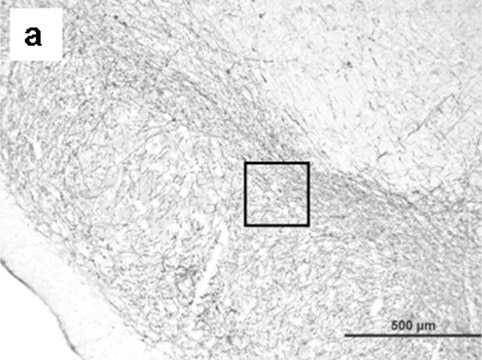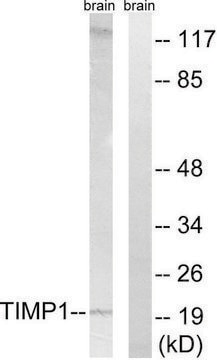General description
We are committed to bringing you greener alternative products, which adhere to one or more of The 12 Principles of Green Chemistry.This antibody is Preservative-free, produced without the harm or sacrifice of animals and exceptionally stable to allow for ambient shipping and storage if needed and thus aligns with "Waste Prevention", "Designing Safer Chemicals" and "Design for Energy Efficiency".
Click here for more information.
ZooMAb® antibodies represent an entirely new generation of recombinant monoclonal antibodies.Each ZooMAb® antibody is manufactured using our proprietary recombinant expression system, purified to homogeneity, and precisely dispensed to produce robust and highly reproducible lot-to-lot consistency. Only top-performing clones are released for use by researchers. Each antibody is validated for high specificity and affinity across multiple applications, including its most commonly used application. ZooMAb® antibodies are reliably available and ready to ship when you need them.
Specificity
Clone 1K11 is a ZooMAb® Rabbit recombinant monoclonal antibody that specifically detects Geminin.
Immunogen
His-tagged full-length recombinant human Geminin.
Application
Quality Control Testing
Evaluated by Western Blotting in U2OS cell lysate.
Western Blotting Analysis: A 1:1,000 dilution of this antibody detected Geminin in U2OS cell lysate.
Tested applications
Western Blotting Analysis: A 1:1,000 dilution from a representative lot detected Geminin in HeLa cell lysate.
Affinity Binding Assay: A representative lot of this antibody bound Geminin with a KD of 4.6 x 10-6 in an affinity binding assay.
Immunocytochemistry Analysis: A 1:1,000 dilution from a representative lot detected Geminin in Caco-2 cells.
Immunohistochemistry (Paraffin) Analysis: A 1:1,000 dilution from a representative lot detected Geminin in human testis tissue sections.
Note: Actual optimal working dilutions must be determined by end user as specimens, and experimental conditions may vary with the end user
Target description
Geminin (UniProt: O75496; also known as Gem) encoded by the GMNN gene (Gene ID: 51053) in human. Geminin is a homotetrameric protein that is mainly localized in the cytoplasm but can also be found in the nucleus. Geminin is an important regulator of proliferation and differentiation in metazoans, which predominantly inhibits the DNA replication licensing factor Cdt1, thereby preventing genome over-replication. It inhibits DNA replication by preventing the incorporation of mini-chromosome maintenance complex (MCM) complex into pre-replication complex. It is not detected during the G1 phase, but accumulates during S, G2, and M phases, and disappears at the time of the metaphase-anaphase transition. Its destruction at the metaphase-anaphase transition permits replication in the succeeding cell cycle. Geminin is reported to inhibit histone acetyltransferase activity of KAT7/HBO1 in a Cdt1-dependent manner and also inhibits transcriptional activity of a subset of Hox protein, enrolling them in cell proliferative control. Geminin undergoes phosphorylation at serine 184 by casein kinase 2 during mitosis, which results in enhanced binding to Hox proteins and more potent inhibitory effect on Hox transcriptional activity. Geminin is reported to interact with IDAS via its coiled-coil domain (aa 94-144), which targets it to the nucleus. It is shown that in contrast to IDAS-Geminin heterodimers, IDAS homodimers are thermodynamically unstable and are unlikely to exist as a stable macromolecule under physiological conditions. Mutations in GMNN gene are known to cause Meier-Gorlin syndrome 6, which is characterized by bilateral microtia and severe intrauterine and postnatal growth retardation. This ZooMAbZooMAb® recombinant monoclonal antibody, generated by our propriety technology, offers significantly enhanced specificity, affinity, reproducibility, and stability over conventional monoclonals. (Ref.: Caillat , C., et al. (2013). J. Biol. Chem. 288(44); 31624-31634; Zhou, B., et al. (2012). Proc. Natl. Acad. Sci. USA. 109(23); 8931-8936; McGarry, TJ., and Kirschner, MW. (1998). Cell. 93(6); 1043-53).
Physical form
Purified recombinant rabbit monoclonal antibody IgG, lyophilized in PBS, 5% Trehalose, normal appearance a coarse or translucent resin. The PBS/trehalose components in the ZooMAb formulation can have the appearance of a semi-solid (bead like gel) after lyophilization. This is a normal phenomenon. Please follow the recommended reconstitution procedure in the data sheet to dissolve the semi-solid, bead-like, gel-appearing material. The resulting antibody solution is completely stable and functional as proven by full functional testing. Contains no biocide or preservatives, such as azide, or any animal by-products. Larger pack sizes provided as multiples of 25 μL.
Reconstitution
300 μg/mL after reconstitution at 25 μL per vial. Please refer to guidance on suggested starting dilutions and/or titers per application and sample type.
Storage and Stability
Recommend storage of lyophilized product at 2-8°C; Before reconstitution, micro-centrifuge vials briefly to spin down material to bottom of the vial; Reconstitute each vial by adding 25 μL of filtered lab grade water or PBS; Reconstituted antibodies can be stored at 2-8°C, or -20°C for long term storage. Avoid repeated freeze-thaws.
Legal Information
ZooMAb is a registered trademark of Merck KGaA, Darmstadt, Germany
Disclaimer
Unless otherwise stated in our catalog or other company documentation accompanying the product(s), our products are intended for research use only and are not to be used for any other purpose, which includes but is not limited to, unauthorized commercial uses, in vitro diagnostic uses, ex vivo or in vivo therapeutic uses or any type of consumption or application to humans or animals.

